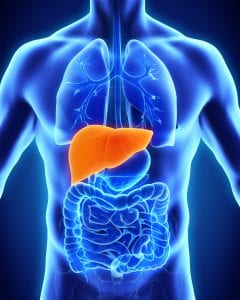Home » Internal Medicine » Fatty Liver Disease
Fatty Liver Disease
- May, 14, 2015
- Trenton Talbitzer
- Internal Medicine
- No Comments.
Fatty liver disease is a national epidemic not only in adults, but in children as well. Obesity and poor diet are known contributors to this condition. It is believed that as many as 20% of adults and sadly 6 million children have non-alcoholic fatty liver disease (NAFLD). This not only increases your risk of developing cirrhosis, liver failure, or liver cancer, it also increases your risk of heart disease as well.
So what exactly is NAFLD? It is an excess deposit of fat and scarring within the liver. This contributes to oxidative stress and inflammation. NAFLD can be silent with little or no symptoms for several years. You may have vague symptoms that you might easily dismiss such as fatigue, weakness, nausea, loss of appetite, trouble concentrating, and abdominal pain. You may never be diagnosed, or this condition may be caught during a routine medical visit. When your health care provider does a blood test and finds your liver enzymes to be elevated. This would lead to further testing to rule out other causes and an ultrasound to look at your liver. The only way to confirm a diagnosis of NAFLD is with a liver biopsy.
So what can you do to prevent developing NAFLD or slow the progression of this mostly silent condition? Your best defense is to eat a healthy diet. Eat foods in their natural form, and preferably organic. The more processed foods, sugar, alcohol, soda, fatty and fried foods you eat, the greater your risks. Though there are other things than diet that contribute to NAFLD, this is one risk factor you have control of. Pick foods with a low glycemic index less than 50. To learn more about the glycemic index, go to www.glycemicindex.com. Foods that support a healthy liver are vegetables, such as kale, dandelion root, broccoli, peppers, beets, asparagus, green leafy vegetables, celery, and artichokes. Consume vitamin C rich fruits such as acerola cherries, lemons, limes, oranges, papaya, berries, and kiwi. Choose healthy protein sources such as grass fed eggs, and chicken, yogurt, wild salmon, shrimp, beans, nuts, seeds, and fats such as extra virgin cold pressed coconut oil, olive oil, flax seed, and avocados. Don’t forget to exercise regularly, limit or avoid alcohol consumption.
There are some supplements that have been shown to support the liver as well. These can include vitamin C and E, milk thistle, alpha lipoic acid, L-carnitine, and N-acetylcysteine. In fact, in the June, 2010 issue of the American Journal of Gastroenterology reported a study where a small group of patients showed statistically significant improvement in their non-alcoholic fatty liver disease when given 1 gram of L-carnitine daily after breakfast and dinner along with a healthy diet as compared to placebo. End results of this study were as follows:
• A 56% and 53% decrease in the liver enzymes AST and ALT, respectively, compared to 38% and 34% in the placebo group (p < 0.001).
• A 22% decrease in total cholesterol compared to 3% in the placebo group (p < 0.001).
• A 31% decrease in LDL cholesterol compared to 5% in the placebo group (p < 0.001).
• A 43% decrease in the inflammatory protein, C-Reactive Protein compared to 15% in the placebo group (p < 0.001).
• A 25% decrease in the inflammatory protein TNF-alpha compared to 6% in the placebo group (p < 0.001).
This is pretty impressive for this one supplement alone. The overall message here is; the best way to take care of your liver is to eat healthy foods in their natural form. This is you and your family’s best defense to avoid being a statistic in the national epidemic of NAFLD.
- Allergy Relief (5)
- Autoimmune (3)
- Back Pain (7)
- Chiropractic (9)
- Food Info (3)
- Health Tips (9)
- Internal Medicine (13)
- MLS Laser (5)
- Nutrition (3)
- Office Information (2)
- Recipes (4)
- Testimonials (6)


Leave a Comment